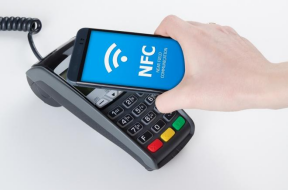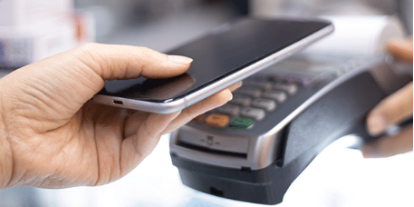
NFC, or near-field communication, is a wireless technology that allows two devices to exchange data when they are placed within close proximity of each other. NFC is already being used in a variety of applications, including contactless payments, public transportation, and even access control. As consumer demand for mobile payments continues to grow, it's likely that we will see even more businesses begin to adopt NFC technology. Here's a closer look at how NFC works and why NFC matters for the future of mobile payments.
How Does NFC Work?
NFC technology uses radio waves to communicate between devices. NFC communication is initiated when one device, called the initiator, sends out a radio signal that is received by the other device, called the target. The target then responds with its own radio signal. This back-and-forth communication allows the two devices to exchange data. NFC typically has a range of about 4 cm (1.6 inches), though the exact range depends on the frequency and power of the signal.

What are the Benefits of NFC?
Ease of use
One of the biggest advantages of NFC is its ease of use. Contactless payments can be made with just a few taps on your smartphone. No need to fumble around for your wallet or enter your card number—all you need is your phone and you're good to go. As consumers become more accustomed to making contactless payments, we can expect to see even more businesses start accepting NFC payments.
Security and fraud prevention
Another reason why NFC is so important for mobile payments is that it offers a high level of security. When you make a payment using NFC, your card number is not shared with the merchant. Instead, a one-time use token is generated that helps to prevent fraud. In addition, many mobile payment apps allow you to set up a PIN or biometric authentication (such as fingerprint or facial recognition) to further secure your account.
Improved operational efficiency
In today's fast-paced world, people want everything to be as efficient as possible—and that includes payments. Mobile payment apps that use NFC allow you to make faster purchases and payments without having to wait in line or register a credit card. This increased efficiency is one of the main reasons why we're seeing such rapid growth in the mobile payments market.

Greater interoperability
Another advantage of NFC is that it's a highly interoperable technology. This means that it can be used with a wide range of devices and platforms. For example, you can use NFC to make payments from your Android phone, even if the merchant only accepts Apple Pay. This increased compatibility will be essential as the mobile payments market continues to evolve.
Wide range of applications
In addition to mobile payments, NFC can be also used to replace QR codes and be placed on products or in advertisements to provide consumers with more information about the product. For example, you might see an NFC tag on a bottle of wine that provides information about the wine's origin, vintage, and tasting notes. This is because the NFC tag is much more efficient and you don’t have to start an App to scan the code. Just tap the item, then everything will be operated automatically on your phone. In China, its legal digital currency also uses NFC technology, offering the possibility to pay both online and offline. Such popularity of NFC technology in commerce is also because mobile phones with NFC technology are priced not as high as before. For example, the 8GB+256GB HONOR 70 price in Malaysia only cost RM 1,999. It's much cheaper than before and people can afford it.
Conclusion
As the mobile payments market continues to grow and standards are implemented, we can expect to see even more businesses adopt NFC technology. With so many benefits, it's clear that NFC is poised to play a major role in the future of mobile payments. Thanks for your reading!







